Recently we had the opportunity to benchmark the Intel Atom C2550 Avoton processor. For those who have been keeping track, the Intel Atom C2550 is one of Intel’s new 22nm SoC processors. It is very similar to the Intel Atom C2750 “Avoton” processor we benchmarked a few months ago. The major difference is that the Intel Atom C2550 is a quad core processor while the C2750 is an 8-core processor. Intel released the 8-core processors first to manufacturers then released the quad core versions. The Intel Atom C2550 is a 14w TDP part thanks to the 22nm tri-gate manufacturing process. Intel cuts the cache in half versus the 8 core version, so the C2550 has 2MB of cache for its 4 cores.
Test Configuration
For this test we used the Supermicro A1SAi-2550F which is a sister platform to the Supermicro A1SAi-2750F. These are otherwise identical platforms other than the processor.
- Motherboard/ CPU: Supermicro A1SAi-2550F with Intel C2550 Avoton 4C/ 4T SoC
- SSD: Intel S3700 100GB SSD
- Memory: 32GB (4x 8GB) 1600MHz 1.35v Micron DDR3 SODIMMs
- OS: Ubuntu 13.10 server x64
- Power supply: 1U 200w 80+ Gold PWS-203-1H
We are using 32GB of RAM here but we have heard 16GB configurations are also popular. 32GB was used here because it is consistent with our C2750 and C2758 platforms. For those seeing the Intel Atom C2550 we have been told that the platform should be widely available in February 2014.
Intel Atom C2550 Benchmarks
The net goal is that we want others to be able to reproduce benchmarks and compare directly to their systems. Since we do not have access to every possible configuration, we would appreciate feedback in that thread which can be as simple as posting log files to run. Help is always appreciated!
One other note, unlike most of our other reviews, we are keeping the comparison set relatively smaller with these benchmark tables. The simple reason is that this is still a “low end” server platform and small text is hard to read. We are including our cloud instance benchmarks so that one can do a comparison of a fairly low-end dedicated platform to a number of cloud platforms.
Hardinfo Performance
hardinfo is a well known Linux benchmark that has been around for years. It tests a number of CPU performance aspects. One major advantage is that one can run this out of the box from many Ubuntu installations.
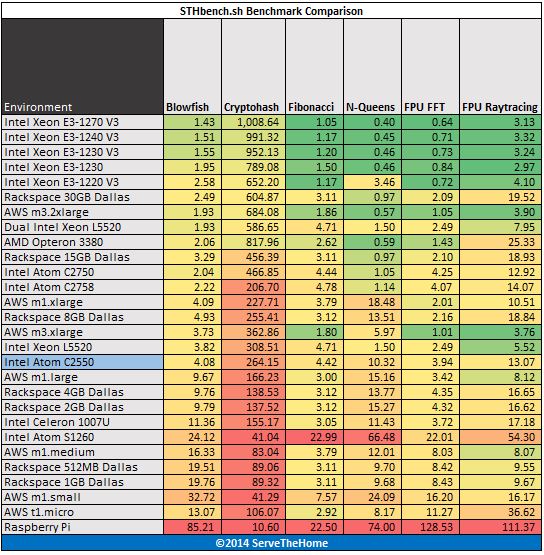
For context, we sort benchmarks on the multi-threaded dhrystone 2 performance (below.) Here we see results in-line with what we expect from the platform, about half the performance of the Intel Atom C2750 in multithreaded benchmarks such as Blowfish. We also see the performance in single-threaded benchmarks, such as the Fibonacci sequence benchmark, resemble what we saw for the Atom C2750. This is simply because we have a similar clock speed with the Atom C2550.
UnixBench 5.1.3 Performance
UnixBench may be a defacto standard for Linux benchmarking these days. There are two main versions, one that tests single CPU performance on that tests multiple CPU performance. UnixBench segments these results. We run both sets of CPU tests. Here are the single threaded results:
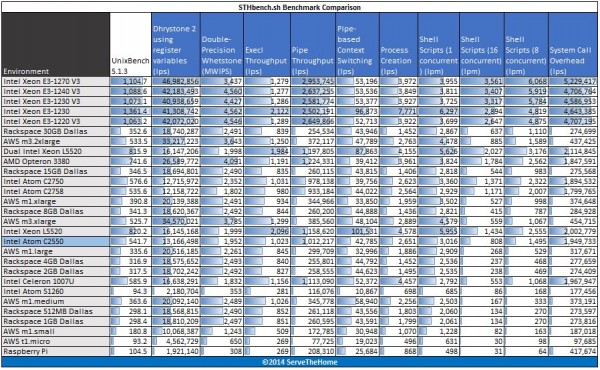
This is certainly becoming somewhat of an eye-chart. Likely due to the fact that we now have too many data points. This is a single threaded benchmark so one will see the Intel Atom C2550 perform similarly to the other Avoton/ Rangeley parts. It also offers similar levels of performance as the Rackspace 30GB standard instance and the Amazon AWS m3.2xlarge.
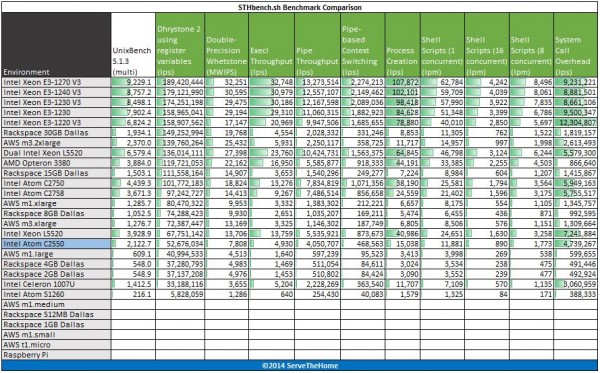
In terms of multi-threaded performance we often refer to the 8-core Intel Avoton as “half a Xeon E3.” The four core variant looks like half of an Avoton or one quarter of a Xeon E3.
c-ray 1.1 Performance
c-ray is a very interesting ray tracing benchmark. It provides both consistent results and some clear separation. Ray tracing is generally a great multi-threaded CPU benchmark. For this test we use both a simple 7500×3500 render and a more complex 1920×1200 render. Here are the results:
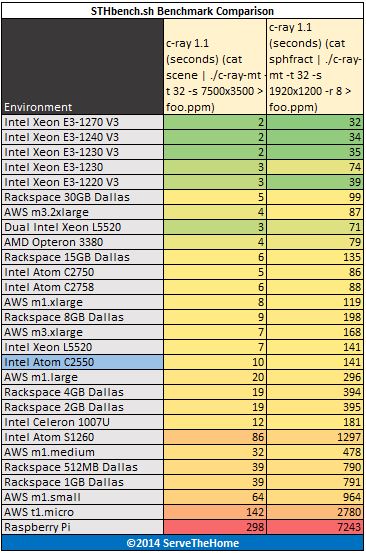
Our c-ray benchmark shows some fairly solid performance using c-ray’s rendering benchmark. In the complex scene it performs similar to the Nahelem based Intel Xeon L5520.
Crafty Chess Performance
Crafty is a well known chess benchmark. It is also one where we saw issues last time with the Phoronix Test Suite and running on ARM CPUs. Here are the Crafty Chess results from simply running “crafty bench”:
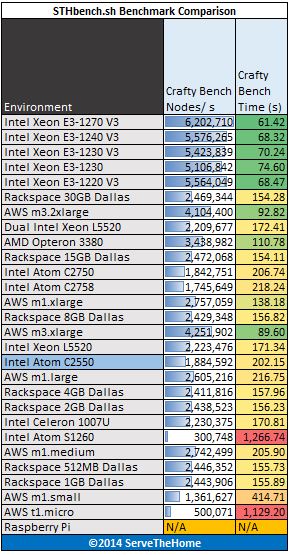
Our crafty chess benchmark is run in single-threaded mode so the Intel Atom C2550 performs similarly to the C2750 and C2758. Perhaps one of the most interesting parts of this is that the Intel Atom C2550 performs about 6x faster than the Intel Atom S1260 here. Taking a step back here, the Intel Atom S1260 was launched about 9 months before the C2550. Total system power consumption is ballpark comparable but the performance difference is large. Also, one gets more memory, network, storage and PCIe expansion with the Avoton platform. When one sees benchmarks of the Intel S1260 v. ARM competitors, that is the wrong comparison. It should really start with the Atom C2550 now at the low-end. For those wondering, the Atom S1260 does not have AES-NI while the C2550 does, so for AES workloads, the C2550 is significantly faster.
Phoronix Test Suite Performance
We are using four tests from the Phoronix Test Suite: pts/stream, pts/compress-7zip, pts/openssl and pts/pybench.
- STREAM by John D. McCalpin, Ph.D. is a very well known memory benchmark benchmark.
- 7-zip compression benchmarks were a mainstay in our Windows suite so we are including it again on the Linux side as a compression benchmark.
- The pts/openssl benchmark is very dependent on the CPU architecture being used
- Python is a widely used scripting language and pyBench is a nice single-threaded Python benchmark.
Here are the results of the Phoronix Test Suite benchmarks:

STREAM showed results that were a bit below what we were expecting, so we will continue to investigate. The other results were in-line with single and multi-threaded performance.
Conclusion
Overall, performance of the quad core Avoton platform is in-line with what one may suspect. Turbo Boost on the Intel Atom C2550 does help in single threaded workloads. Lower power consumption is also welcome. After having benchmarked many different Avoton and Rangeley configurations over the past four months, the way to think about this is as half an Avoton or a quarter of a Xeon E3-1200 series processor in terms of performance. One gets 6w lower maximum TDP at 14w but in the context of an entire system, that is quite a bit. We are very likely to see Atom C2550 based commercial NAS products in the next few months as the C2550 provides plenty of processor for most lower-end NAS/ cold storage applications.
The big story here is price. The Intel Atom C2750 seems a bit overpriced with a MSRP of around $171. The Intel Atom C2550 on the other hand has a $86 MSRP. That should lead to close to $100 difference in end-product nodes with the C2550 being much more reasonable. If the C2750 was priced at $100 and the C2550 was priced at $60 Intel would put ARM vendors in a very difficult position.
N.B. on pricing: we have seen these Supermicro platforms sell for $500 before full volume shipments occur. This should fall by about half within a month as greater supply hits the market.

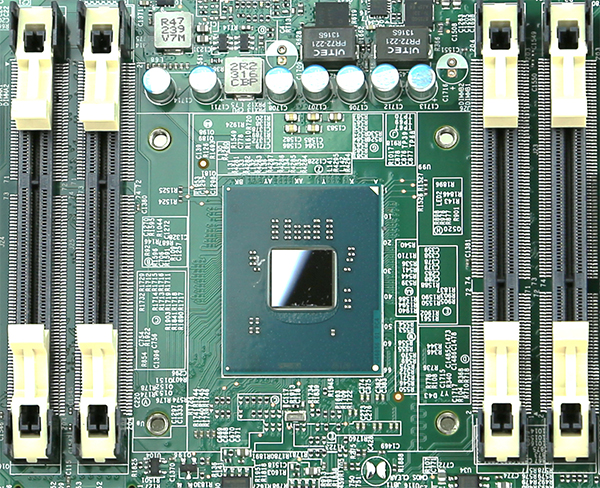
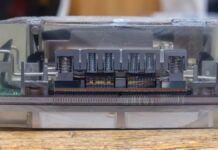
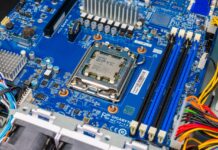
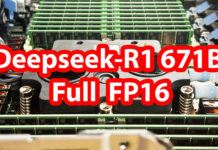
I am excited to see this take off. Been waiting since September 2013 for this review.
I dunno how ya’ll do it but first benchmarks?!!? again?
Hi Patrick.
Thanks a lot for an excelent review.
Do you have numbers about power consumption of that system?
Idle and under full load?
Sucks Intel doesn’t let these have VT-d.
Hi will have more on that with the Supermicro A1SAi-2550F review coming out shortly. On these low power systems other components make up such a big portion of the power that it makes sense to test power at a platform level.
Patrick,
Is there anyway you can do a tutorial ( for beginners) on Supermicro’s IPMI interface and what can be done in that interface. Including how to prep ISO images to mount or image to the HD of servers that have this interface.
Where do you get the 50% price difference? From a short check, it seems like 2550 and 2750 are priced very similar at the moment.
I think he is referring to the suggested pricing for just the chips from intel
Yes me too. Especially for the cost of these.
and no AVX or AVX2 simd instructions,shame lets hope the new 64bit Arm Cortex octa cores have good NEON SIMD COVERAGE
Hi,
What about information related to transcoding HD materials with i.e. Plex server? I’m wondering if it is enough power to trancode fullHD movie at least for one device… Did somebody any tests about that or maybe using it?
I would not use the C2550 for transcoding. I have a very low power box with Quick Sync which is much faster.
Huh? What CPU does this ‘box’ use? I have an older QNAP TS-215P+ which is ARM equipped and it takes Days to to Transcode a ripped Blu-Ray. Renders the NAS all but useless while doing so. I think if this Intell was in my QNAP it would be much quicker and not to mention the RAM…Although I think they offer Atoms in QNAPs now :(
Sry. that’s a TS-219P+